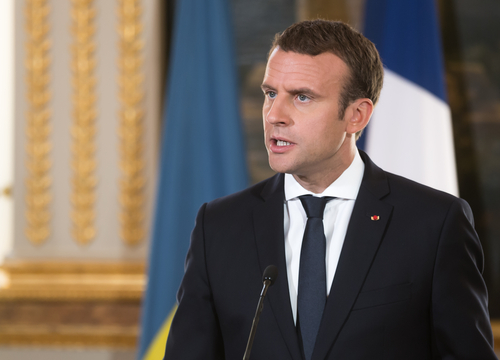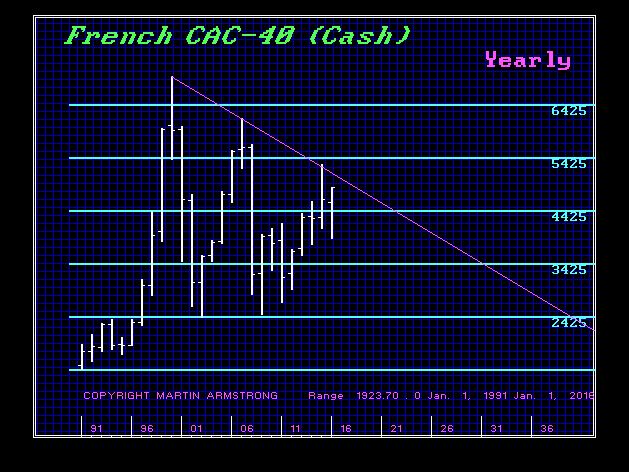Macron’s Call to Federalize Europe
France’s President Emmanuel Macron is calling for a radical restructuring of the whole EU. Macron has presented his map for the EU into 2024. He is proposing that the Eurozone budget must include a joint force for military operations. Macron intends to finance this new budget with its tax – the “EU tax” he calls it.
Macron has looked at the numbers and see that France will go the way of Greece if something is not changed and soon. Macron hopes just to throw all the rotten eggs into one basket and hope nobody will notice. It’s the Three Musketeers – All for one; One for All just times 28.
Germany is still dominated by its misunderstanding of the Hyperinflation. Former Greek finance minister Yanis Varoufakis supports Macron’s federalist proposals on the euro single currency but believes only a real threat could make Germany budge on the issue. It has been Germany that opposed the consolidation of the debts to form the Euro. They are trying to remain isolated in their austerity posture refusing to budge on the debt consolidation, while at the same time they want the single currency to facilitate German exports eliminating foreign exchange risk among other members. They just cannot have it both ways.
The extent of Macron’s plan goes beyond just an EU Tax. He also says that Europe is moving at “different speeds” and that those states which fall behind should not stand in the way of his proposals. He is calling for a European defense budget and a standard minimum rate for company taxes.
Macron has noted the high cost of taxing the rich. The Socialist agenda under Hollande imposed a wealth tax which drove 10,000 people with about 35 billion euros to flee the country. And that is just what they admit publicly. The tax was imposed on personal assets of more than 1.3 million euros is part of Macron’s reform, but the socialists are demanding they be taxes even more until they all leave one must assume. As promised by President Emmanuel Macron in the election campaign, the tax will now only apply to real estate, meaning other forms of wealth such as shareholdings in companies will be exempted. Macron realizes that the French share market has one of the worst performance in Europe next to Greece. While the world is worried about bubble markets, Macron is concerned that new lows will unfold on the next crisis.
“When someone leaves the country because of the wealth tax… collectively all French lose.” But the Socialists just refuse to stop their hatred of the rich. Macron has abolished the wealth tax and the socialists are calling him the “President of the rich” and remain oblivious to reality.
More than fifty years ago, back in 1965, it was the French President Charles de Gaulle who withdrew his ministers from the Council of the EU, thereby constituting a de facto veto over all decisions, which became known as the “Empty Chair Crisis.” There were several issues regarding European political integration led to The Empty Chair Crisis. There was a push at that time to create the quasi-federalization of Europe. De Gaulle believed that national governments should move towards integration, but he did not agree with the Commission’s attempt to create some new super central state or a federalized Europe, extending powers of the EU beyond national borders as we have today, which Margaret Thatcher also opposed.
President Charles de Gaulle has proposed the Fouchet Plan was a plan back in 1961 to create a new grand design for Europe. Charles de Gaulle wanted to develop a three-power directorate, consisting of France, Britain and the United States. The idea was to form a new ‘Union of States’, as an alternative to the European Communities (EC). De Gaulle feared a loss of French national influence in the EC as there was a drive to federalize Europe back then.
After the failure of the Fouchet Plan and De Gaulle’s veto of the United Kingdom’s application for EC membership, the Commission attempted to move towards integration by proposing an idea that would combine the Common Agricultural Policy (CAP), the European Parliament, and Commission. De Gaulle supported the creation of the CAP and favored its enactment. However, he disagreed with the Parliament’s new role, the Commission’s strength, the shift towards federalization and a super central state, and the budget proposals for financing the CAP. De Gaulle made it a condition that majority voting with a right to veto must exist if France was to participate in the EC. When de Gaulle was denied a more intergovernmental Commission or voting and veto rights, the French representative left the Council of Ministers thereby creating the Empty Chair Crisis.
The Luxembourg Accord was an agreement reached in January 1966 to resolve the “Empty Chair Crisis” which had caused a stalemate within European Economic Community. Then on June 21, 1966, de Gaulle withdrew France in a shocking move taking its troops from the North Atlantic Treaty Organization (NATO). This decision led by French president Charles de Gaulle complicated relations between the U.S. and Europe amidst clashing American and Communist spheres of influence. Though France remained politically in NATO, its actions cast doubt on the organization’s future as a counter to Soviet military power and control back then.
Disagreement within the EU is by no means something new. We may yet see a political breakdown as the economy continues to spiral lower and the ECB bond-buying program has been transformed from an economic stimulus to simply life-support for government debts to try to keep interest rates from exploding and no bid for government debt.
Apart from the new EU tax, Macron did not make any funding proposals for his very far-reaching program. The FT reported his “wish list” and presented the most desired demands of Macron:
- EU intervention group and budget by 2020
- a European Intelligence Academy to train spies
- a European civil protection group for responding to disasters
- a European prosecutor for terrorism and organized crime
- a European asylum seeker for the joint processing of claims, common procedures
- a European border police
- a carbon dioxide tax levied on imports into the EU
- a European innovation agency for the investigation of artificial intelligence
- EU subsidies to support creating electric vehicles
- Taxation of US tech companies with a tax on sales, rather than on profits
- a larger EU budget to finance investments and dampen economic shocks
- Review of agricultural policy and the new EU Food Authority
- accelerated harmonization of corporation tax bases
- gradual harmonization of corporation tax rates and social security contributions
- a guaranteed minimum wage for each country
- all young Europeans will be able to spend six months as a student or trainee in another EU country
- Creation of European universities on the basis of networks of institutions
- six-month series of national and local conventions to discuss the future of Europe
- half of MEPs to EU Parliament is to come from EU-wide lists until 2024
- a much smaller European commission, only 15 commissioners
- a Europe of different speeds, to which Great Britain could also return
- a new European prosecutor ensures that the competitors comply with the EU rules
- a Franco-German cooperation agreement focusing on the harmonization of company regulation


